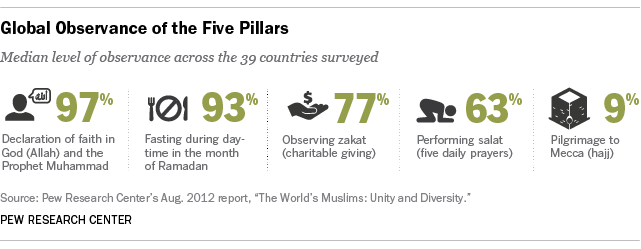Today marks the beginning of Ramadan for many Muslims around the world. (The start of Ramadan varies by locality based on the sighting of the new moon by religious authorities.) The ninth and most sacred month of the Islamic calendar, Ramadan marks the first revelation of the Quran to the Prophet Muhammad and is a time of increased spiritual reflection and devotion. Adherents traditionally abstain from food and drink during daylight hours throughout the month, from the first light of dawn until sunset. Fasting during Ramadan is one of the Five Pillars of Islam, meaning it is among the core rituals of the faith.
A recent Pew Research Center survey of more than 38,000 Muslims around the world shows widespread observance of Ramadan. In the 39 countries and territories surveyed, a median of 93% say they fast during the holy month. Fasting is the second-most observed of the Five Pillars, behind only belief in God and the Prophet Muhammad (median of 97%).
By comparison, a median of 77% of Muslims in those 39 countries say they give zakat (an annual donation of a portion of one’s wealth to the needy). And a global median of 63% of Muslims surveyed say they perform five salat (prayers) a day. A median of just 9% of Muslims say they have already completed the hajj (the pilgrimage to Mecca), although this once-in-a-lifetime obligation applies only to those who are financially and physically capable.

Although fasting during Ramadan is widespread across the countries surveyed, there is some regional variation. Fasting among Muslims is nearly universal in the Southeast Asian and South Asian countries surveyed. By contrast, in several Central Asian and European countries, fewer than half of Muslims report abstaining from food and drink during Ramadan: 44% in Albania, 43% in Azerbaijan and 30% in Kazakhstan. (See a chart that shows the data for all 39 countries surveyed.)
Pew Research has not asked American Muslims whether they fast during Ramadan, but a 2007 survey found that three-quarters (77%) of Muslim Americans say fasting during Ramadan is very important to them.